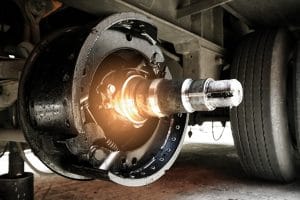Who Is Liable for Texas Truck Accidents Caused by Defective Brakes?
 According to the Commercial Vehicle Safety Alliance (CVSA) and International Roadcheck, nearly four in 10 out-of-service violations are due to brake system and brake adjustment violations in North America. CVSA also points to a report by the Federal Motor Carrier Safety Administration (FMCSA) that lists “brake system” failure as causing 0.9% of large trucks in fatal crashes by vehicle-related factors in 2018. While this percentage may seem low, brake system failures are the third most common type of vehicle-related safety concern.
According to the Commercial Vehicle Safety Alliance (CVSA) and International Roadcheck, nearly four in 10 out-of-service violations are due to brake system and brake adjustment violations in North America. CVSA also points to a report by the Federal Motor Carrier Safety Administration (FMCSA) that lists “brake system” failure as causing 0.9% of large trucks in fatal crashes by vehicle-related factors in 2018. While this percentage may seem low, brake system failures are the third most common type of vehicle-related safety concern.
The vice-president of Reliance Partners states that Roadcheck’s numbers are likely on the low side due to the impact of COVID-19 on truck driving. The vice-president adds that a counter-thought is that brake system failures could decrease in 2021, “as carriers are switching to disc-style brakes, which are more reliable than drum-style brakes.”
Brake Safety Week
In response to the concerns about brake system failures, Freightwaves reported that the CVSA established a Brake Safety Week (Aug 22-28). During the week, inspectors will conduct North American Standard Inspections of commercial motor vehicles. The inspectors will focus on brake systems and components. Any vehicles with faulty brakes will be taken off the road. CVSA intends to focus primarily on brake hoses and tubing. CVSA states that, in its experience, announcing a week of inspections yields better results than surprise enforcement campaigns.
Suggestions for truck drivers
The VP of Reliance Partners suggests that truck drivers (and truck owners) conduct regular checks of their trucks, watching closely for:
- Damaged or worn-out brake drums
- Pads and shoes
- Slack adjusters
- S-cams
- Hoses
- Brake functionality
- The taillights
Drivers should also test the air brakes.
This testing can be done by placing a brick (or other heavy object) on the brake pedal and “watch the air gauge and listen for any escaping air with the brakes applied.” The VP also recommends “checking for any air leakage around the tractor system by chocking the wheels, releasing the trailer brake, but keeping the tractor brakes engaged, and vice versa.”
Other brake safety checks usually involve two people so the push rods can be measured. He adds that examining the push rods can be dangerous and does require that that the testers know what they’re looking for underneath the cab.
Truck drivers should also know the last time the truck brakes were adjusted.
Defective truck brakes – a current investigation
The NHTSA is currently investigating brakes manufactured by Haldex Commercial Vehicle Systems. Complaints filed suggest that their brakes may have caused seven fires, with 11 complaints asserting that the brake problems involved mostly Kenworth and Peterbilt semis. The NHTSA is investigating nearly 500,000 semis, focusing on models built between 2015 and 2020.
The NHTSA’s investigation is focusing on Gold Seal brake chambers made by Haldex. The chambers “convert compressed air into a mechanical force” that causes the trucks to stop. A “spring can fracture, puncturing a diaphragm and causing air loss. The brakes can then drag (with warning the driver) ultimately causing a fire.”
The NHTSA says that the fires cause severe truck damage and can also damage the cargo. The agency says multiple truck fleets raised concerns. The investigation will determine how often the brake problem occurs, what models are affected, and whether a recall should be issued.
Who can be held responsible for defective truck brakes if a truck accident occurs?
At Slack Davis Sanger, our experienced Texas truck accident and product liability lawyers fight to hold all responsible parties liable for your injuries or the death of a loved one. Who is liable for the crash depends on the cause of the accident.
Product defects. If the truck brakes were defective, then the manufacturers, distributors, and sellers of the defective brakes can be held strictly liable:
- If the brakes were defective at the time of the accident
- The defect caused the truck accident
- The truck accident caused your injuries or a fatality
Brakes can be considered defective if they were designed improperly or they were manufactured using substandard workmanship. We work with truck safety engineers and professionals who examine the ways in which the brakes are defective.
Strict liability means there is no need to prove the manufacturer (or other responsible companies) were negligent. They are held strictly liable because they put their profit ahead of your safety.
Negligence. Truck drivers and truck owners need to regularly inspect their trucks before each trip and after each trip. These inspections can often show whether the brakes or any other truck parts need maintenance or if the brakes/truck parts are defective. A failure to conduct these routine inspections can cause an accident. In addition to the driver and truck owner, maintenance and repair companies may be liable if they fail to make the necessary repairs.
Breach of warranty. Most trucks and truck parts come with express and implied warranties. If a truck’s brakes fail, the manufacturers, distributors, and sellers may be liable based on a showing that these warranties were breached.
Drivers may also be liable for truck accidents if they fail to use the brakes at appropriate times and in an appropriate way.
At Slack Davis Sanger, our Texas truck accident lawyers have more than 200 years of combined experience fighting for drivers, passengers, and pedestrians killed or seriously injured due to faulty or defective truck parts including brakes. We work aggressively to show how the accident happened and who is responsible. Our team demands compensation for your pain and suffering, medical expenses, and lost income. If a loved one tragically dies, we file a wrongful death claim on behalf of the family survivors.
To speak with our experienced lawyers or to schedule a free consultation in Fort Worth, Dallas, or Austin, please call 800.455.8686 or fill out our contact form.

The firm handles cases involving catastrophic personal injuries and deaths. Our work spans three decades of handling airplane and helicopter crashes, truck and car accidents, oilfield and construction accidents, and other devastating accidents. We try lawsuits throughout the country in both federal and state courts and have recovered hundreds of millions of dollars for our clients. To date, we have handled or tried cases in 47 states, read more about our attorneys and firm.
